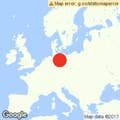JENA, Germany — Nazi chants rang out in the east German city of Jena last week, as marchers promised to “build a subway” to Auschwitz for political opponents and declared, “Here rules the National Resistance.”
These words were shouted by some participants of a campaign rally in support of Alternative for Germany — AfD for short — a four-year-old nationalist party that is poised to enter parliament as Germany’s third-largest party in elections on Sunday. It would be the first time that a nationalist party has held seats in Germany's legislature, the Bundestag, in more than half a century.
While the AfD is not a Nazi party, its candidates have smashed many of the taboos of German politics established as the country rebuilt its democracy after Adolf Hitler’s defeat. As it rapidly transformed into a major party, the AfD has roused even more extreme factions from the shadows of German politics that push the limits of the country’s strict laws against Nazi propaganda and hate speech, put in place to ensure that that kind of nationalism could never rise again.
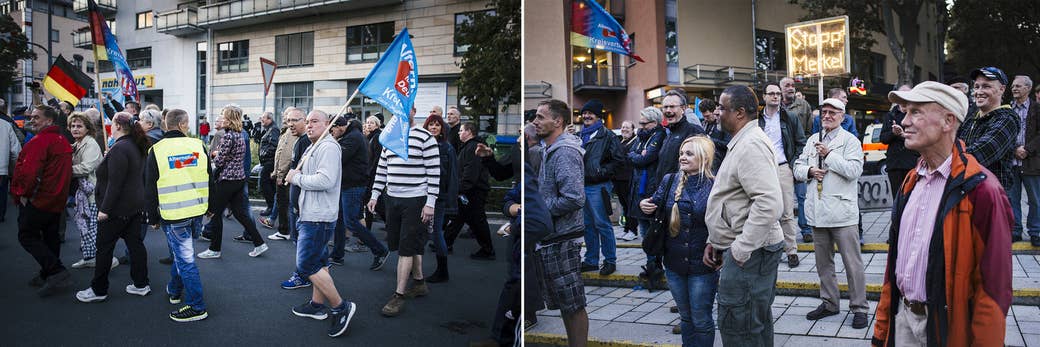
Flouting the rules of German politics seemed to thrill these AfD marchers on that September evening. That’s why Katharina König-Preuss, an anti-fascist activist from Jena and a member of the legislature for the east German state of Thuringia, had slipped past the heavy police barricades to keep an eye on them. She filmed the clutch of marchers who shouted Nazi chants at the back of the AfD’s small parade and filed a criminal complaint against them later in the week.
The impending election, König-Preuss worries, is the crack in the wall that could allow the horrors of the past to return.
“The politics and the language of the AfD results in stuff that was unsayable years ago [becoming] sayable and perceived as normal again,” König-Preuss told BuzzFeed News as she chain-smoked cigarettes at a youth center in Jena run by her father, a well-known left-wing pastor.
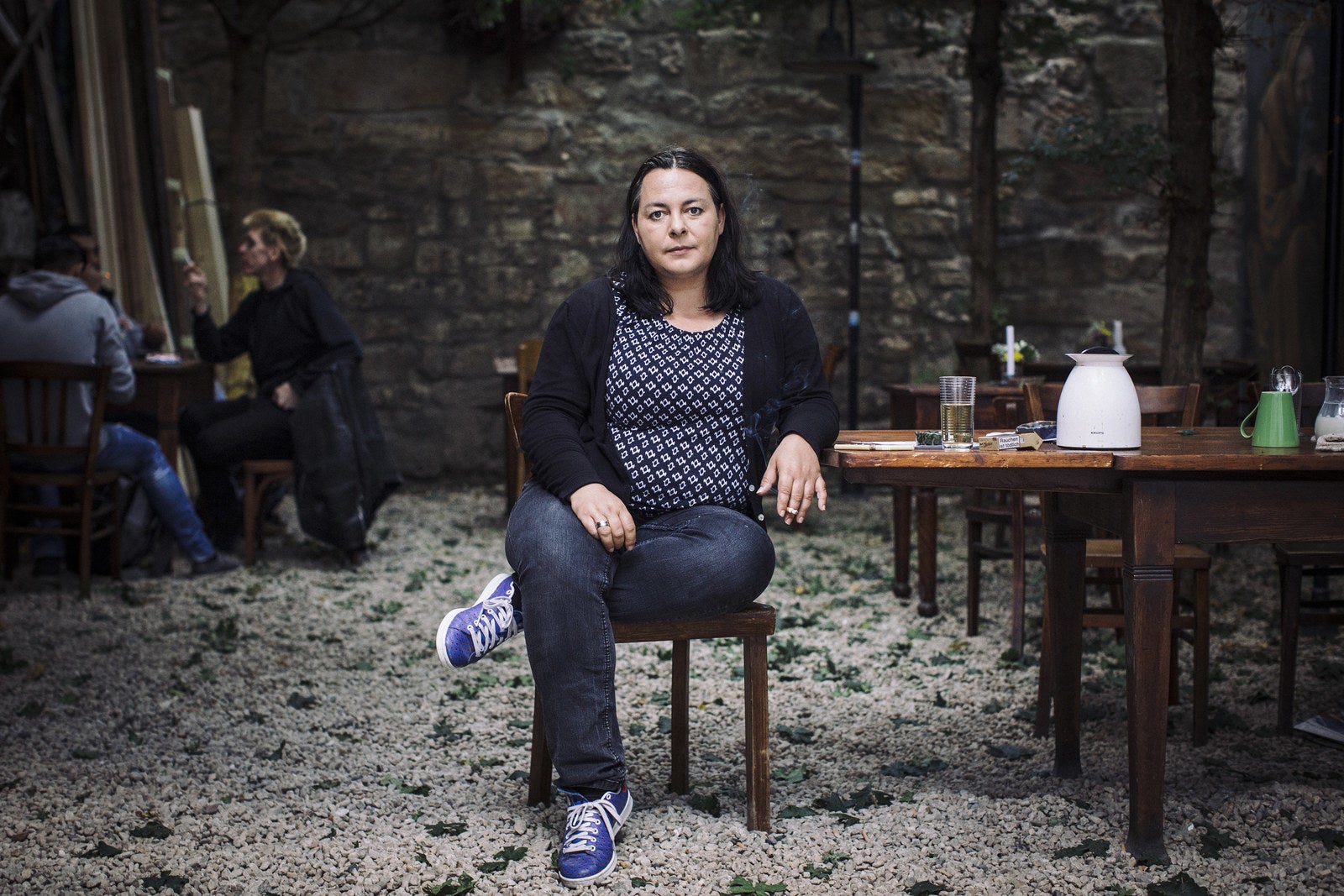
No one expects the AfD to win on Sunday; polling suggests that Chancellor Angela Merkel will easily win enough votes to secure a fourth term as Germany’s leader. The nationalist wave that crested with Britain’s vote to leave the EU and Donald Trump’s victory in the United States didn’t lead to the toppling of mainstream parties across Europe. But once-marginal factions have pushed the debate far to the right in election after election held this year across Europe.
And that’s especially scary to the AfD’s opponents, who see it as a sign that the lessons of Germany’s past could quickly be forgotten.
“This atmosphere results in Nazis thinking they have a resonance from the majority in the population.”
“They took up the feeling of some Germans being afraid. There is [no message] of hope inside the AfD,” König-Preuss said.
All they offer is a promise to “get strong as Germans,” she said, “and that’s something like what Hitler did in 1933 ... and what escalated into the second world war.”
Germany’s democratic system doesn’t have to collapse for this mood to do serious harm, she said.
“This atmosphere results in Nazis thinking they have a resonance from the majority in the population,” she said. “I don’t want to [say that] it’s possible to get a second Holocaust or Shoah. I don’t want it; that’s why I say it will not be — and I hope that people are strong enough to try to resist.”
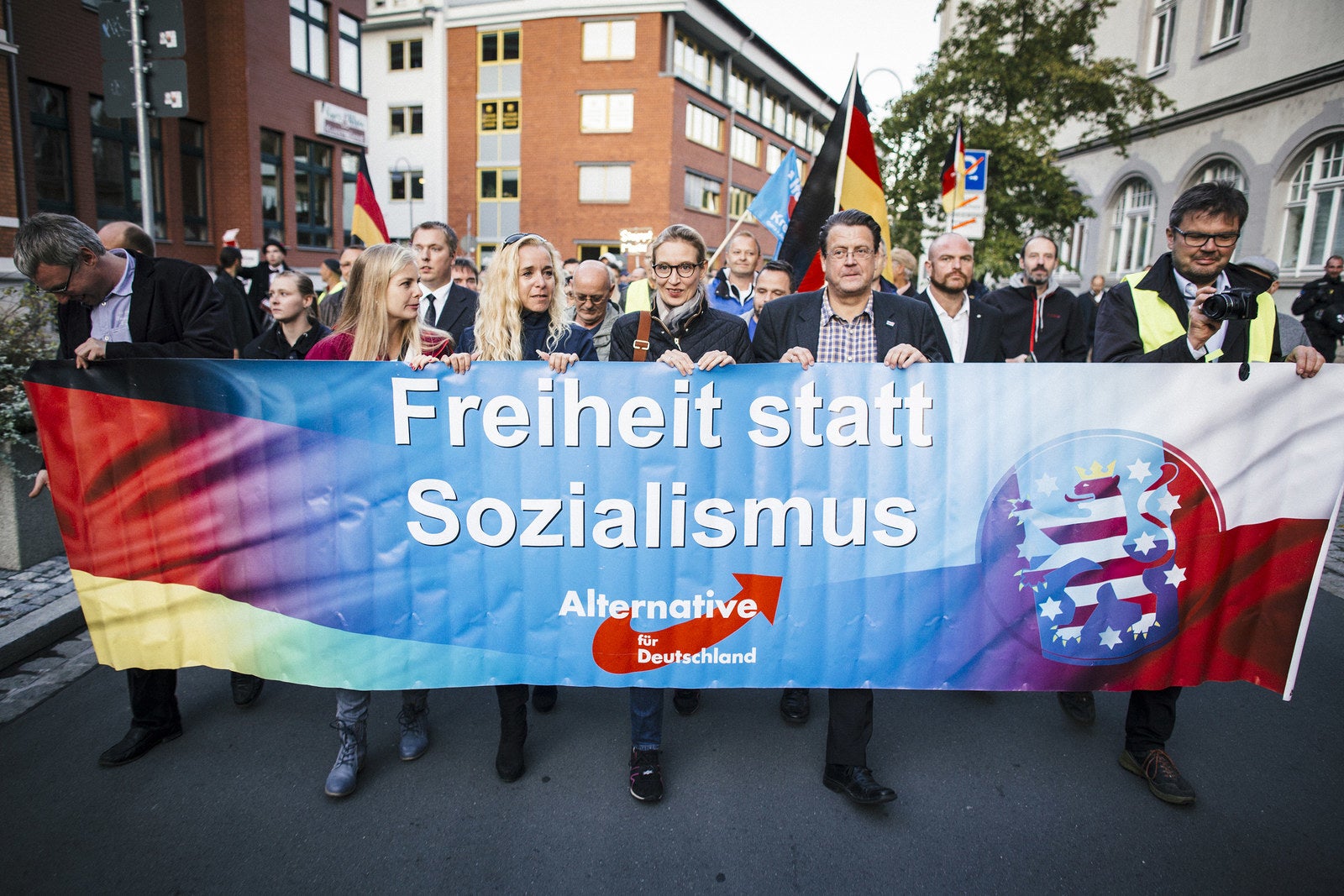
The headliner of the rally in Jena was Alice Weidel, one of the AfD’s top candidates for the Bundestag and a symbol of everything that was supposed to make the AfD different than the far-right parties that have failed before.
Weidel is a lesbian, raising two children with her partner, Sarah Bossard, a film producer who lives across the border in Switzerland. She has a PhD in business administration and has worked at Goldman Sachs and other investment firms in Germany and in China.
The party was created in 2013 by a group that included a number of economists opposed to Germany bailing out other eurozone countries. But the backlash against the more than 1 million asylum-seekers who entered Germany in 2015 and 2016 propelled the party into a number of state parliaments, and it moved steadily to the right.
“We have the right to be proud of the achievements of German soldiers in two world wars.”
A rift opened inside the party between more radical factions and party leaders who feared they would open the AfD to accusations of extremism. When a group called Patriotic Europeans Against the Islamization of the West — known as Pegida for short — began organizing a wave of anti-Muslim demonstrations in 2014, AfD chairwoman Frauke Petry tried to block party members from participating. She was largely ignored.
The AfD selected Weidel as a top candidate for the Bundestag during its April convention as a compromise with more nationalist factions. She shares the lead spot with Alexander Gauland, who — as BuzzFeed Germany first reported earlier this month — recently said, “We have the right to be proud of the achievements of German soldiers in two world wars.”
Weidel is generally more careful than Gauland, but this month the newspaper Welt am Sonntag reported that she wrote a memo in 2013 saying Germany was being “overrun by culturally alien peoples such as Arabs, Sinti and Roma” and denouncing the current government as “pigs [who] are nothing other than marionettes of the victorious powers of the second world war, whose task it is to keep down the German people.”
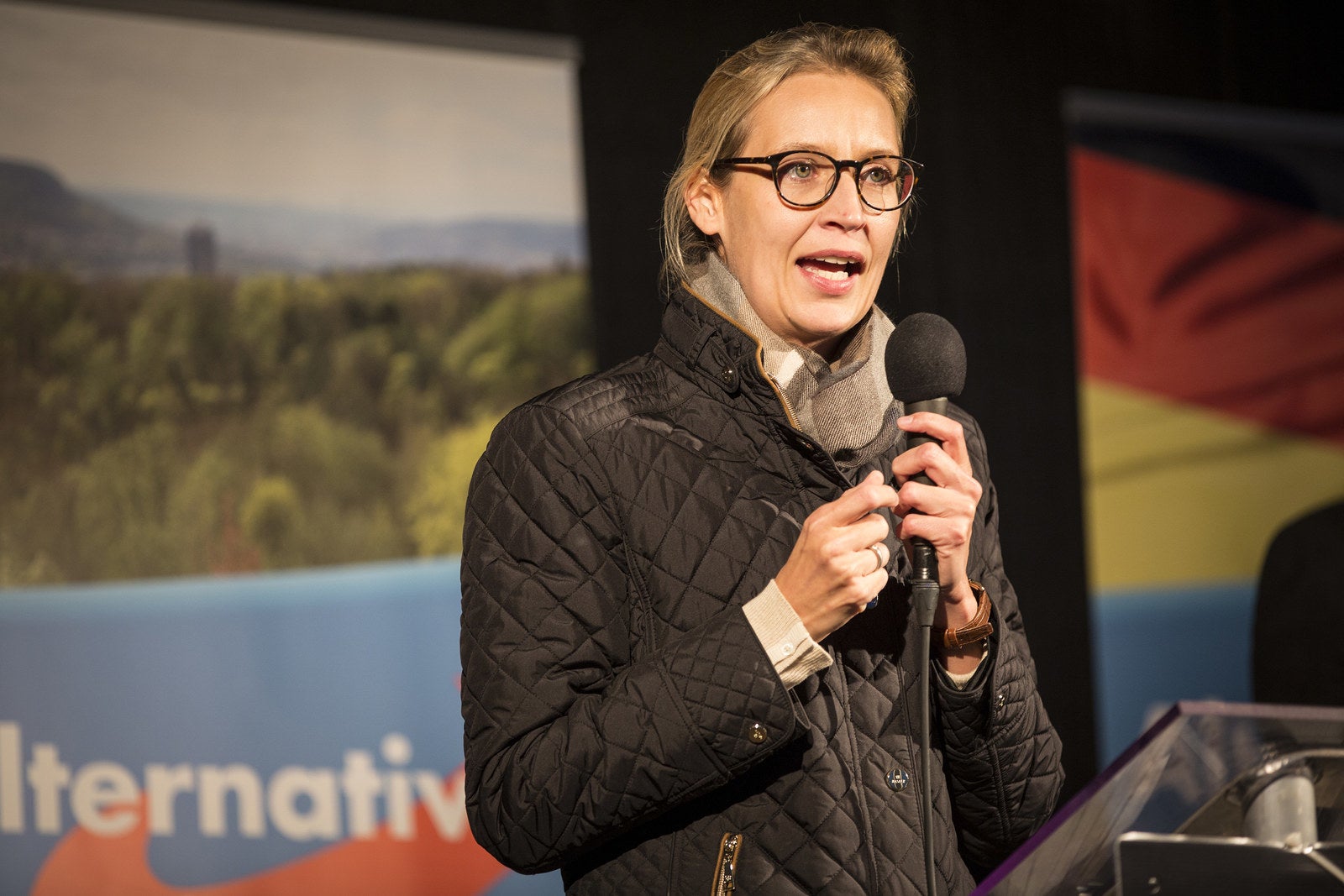
Weidel seemed to be forgetting about Hitler during her speech in Jena, saying Merkel has “divided this country and Europe like nobody has before.” She continued, “The AfD is the only chance left to restore law and order in Germany. We want to make policy [in favor of] our country, for a Germany with a future where law and order mean something.”
When asked by BuzzFeed News about the Nazi chants, Weidel said she was not there at the beginning of the march but did not denounce them. Though such slogans violate German laws against hate speech, the instigators were not removed by organizers.
“I was not there, but I am not responsible for those people who tag along at our protests,” Weidel said.
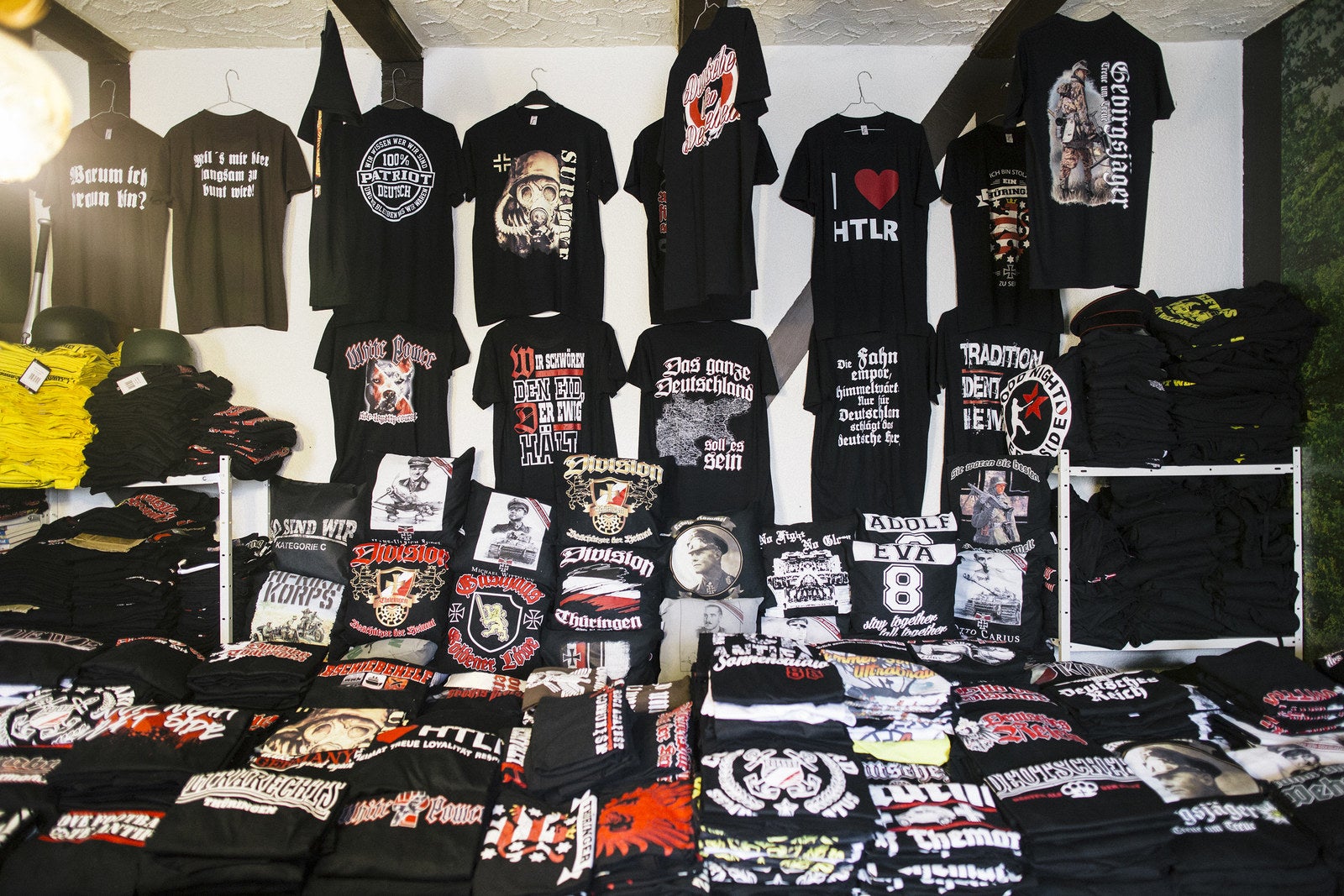
In July, 6,000 people swamped Themar, a town of 2,900 people at the foot of Thuringia’s mountains, where they forked out 35 euros per ticket for a show billed as “Rock Against Foreign Infiltration.” Video of the night captured fans raising their hands in Hitler salutes; a singer is now under investigation for shouting “Sieg heil” from the stage; and police ultimately brought dozens of other charges ranging from weapons possession to violating laws against Nazi symbolism.
Concerts of what’s known as right rock (rechtsrock) have generally been small and secretive affairs. But this was the largest neo-Nazi spectacle in more than a decade, and it was made possible by a local AfD politician named Bodo Dressel. He’s the mayor of a nearby village and the owner of the land where the concert took place. He leased it to a man named Tommy Frenck, who runs a shop selling neo-Nazi gear and a bar that hosts right-wing rock bands.
With Dressel’s help, and the shifting political climate, organizers felt the time was right to put on a major festival. Dressel left the AfD after his arrangement with Frenck caused a scandal, but the incident illustrates the forces that the AfD has helped empower, said König-Preuss, the left-wing Thuringia state legislator.
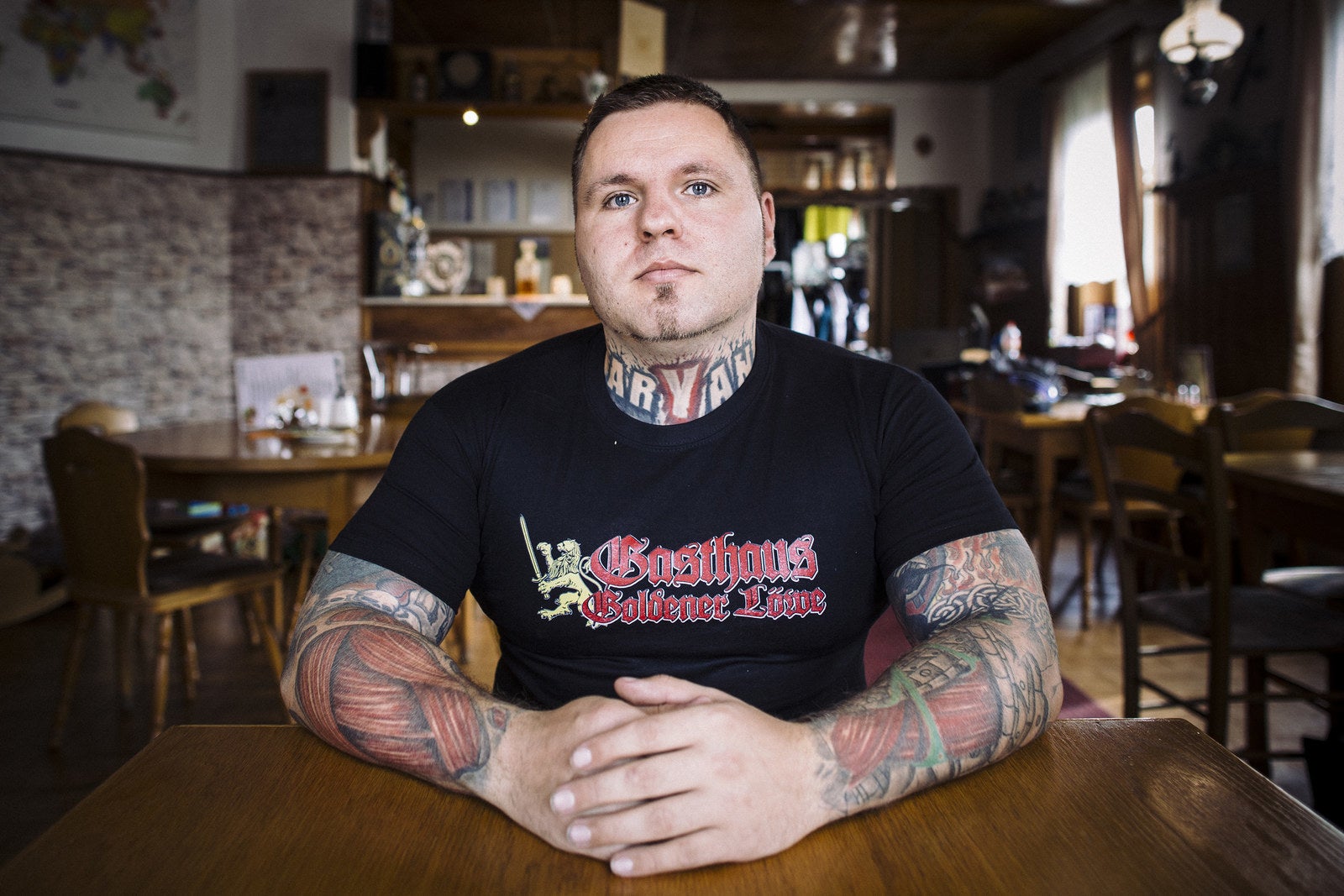
“This atmosphere that we have right now leads to people like Tommy Frenck feeling like, ‘Oh yeah, I can just do that — I can organize a concert and … neo-Nazis will show up from all over Europe,” König-Preuss said. “And the ground where that happened didn’t come out of nowhere, but from a former AfD.”
Frenck is a beefy 30-year-old who has the word “Aryan” tattooed across his throat. He’s been active in right-wing politics since high school, when he joined the National Democratic Party (NPD), which Germany’s authorities have twice tried to ban for violating laws against Nazism.
Frenck managed to get elected to a regional council in 2009, but was a relatively minor figure in neo-Nazi circles until recently. He made himself into a national player by distributing right-wing memes. Not online — an alt-right–style internet universe hasn’t really caught on in Germany — but printed on T-shirts, stickers, and home decor. His store, Druck18, sells paraphernalia that skirts Germany’s laws against Nazi propaganda, including stickers with slogans like “I HTLR” and throw pillows with the faces of Nazi generals on them. Business is so good, he said, that he’s thinking about opening franchises in other parts of the country.
The store sells paraphernalia that skirts Germany’s laws against Nazi propaganda, including stickers with slogans like “I ❤️ HTLR” and throw pillows with the faces of Nazi generals on them.
Frenck left the NPD to become an independent in 2009, and the party has since collapsed almost entirely. He said the AfD is not a perfect replacement — it’s “too liberal” on some questions, even immigration, he said — but there are factions inside the party that give him hope.
“Next weekend I give my choice to the AfD,” he told BuzzFeed News.
He said he was ambivalent about this, in part because the AfD are “distancing themselves from anyone who’s been called a Nazi.” He likes the leader of the AfD in Thuringia, Björn Höcke, who was threatened with expulsion from the party after denouncing the Holocaust memorial in Berlin but has managed to hang on to his position. (Party leaders also accuse him of writing under a pseudonym for the NPD, a charge he denies.)
“We have to see which wing of the party will win,” Frenck said.
Frenck’s partner in organizing the concerts is Patrick Schröder, who runs a clothing company called Ansgar Aryan out of a small storefront in a nearby ski town, next door to a candle shop and across the street from a florist.
He also entered politics through the NPD and still plans to vote for them out of a sense of loyalty. But, he said, it makes sense for younger right-rock fans who want to enter politics to go to the AfD today. The party is shifting politics “in our direction,” he said.
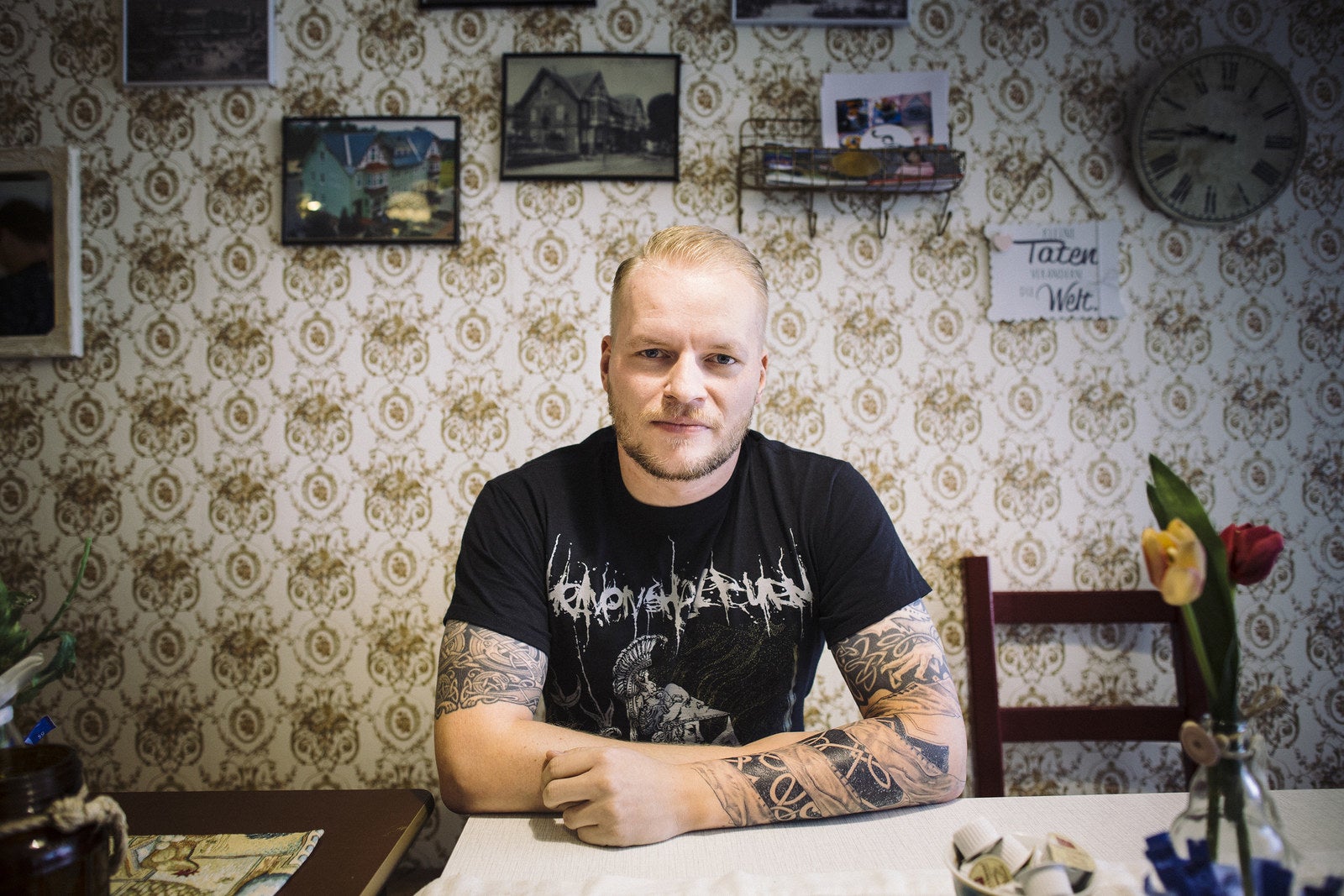
The specter of an emboldened Nazi movement is especially ominous in Thuringia, where right-wing violence still feels like a present threat.
On the same day that Weidel was campaigning in Jena, a German court held a hearing in a case against a member of a right-wing terrorist group formed in the city.
The group was called the National Socialist Underground, and in 2000 its members began an eight-year spree in which they killed eight Turkish immigrants and two others; the group also wounded 22 people with a bomb set off in a Turkish neighborhood in Cologne in 2004. An underground network of sympathizers helped the group avoid police until 2011, including one supporter named André Eminger who is accused of renting apartments for them. Eminger reportedly attended Frenck’s concert in July.
“I can organize a concert and … neo-Nazis will show up from all over Europe.”
While there’s no evidence that an overtly neo-Nazi party could make a comeback in Germany, polling shows a surprisingly large minority receptive to anti-democratic and anti-immigrant campaign messages.
Nearly a quarter of Germans in a 2016 survey said they believed “What Germany needs now is a single strong party that embodies the national community as a whole,” and the number was much higher in some places — 60% of people surveyed in the east German state of Saxony agreed with that sentiment. One in three people surveyed nationwide said the growing number of Muslims makes them feel “like a stranger in my own country.”
This has contributed to a surge in what are known as “political crimes,” ranging from spreading propaganda for unconstitutional organizations to violent attacks targeting immigrants. Police reported 23,555 right-wing crimes in 2016, the highest number since the interior ministry began collecting data in 2001. (That’s seven times as many as “foreigners’ political crimes,” a category that includes Islamists.)
The challenge now, Frenck said, is for the AfD and other elements on the right to stop fearing being called Nazis and start working together.
“The problem is, everyone is arguing with each other and is divided,” Frenck said. “The Nazis back then [in the 1930s], they didn’t reinvent the [German monarchy]. They brought in a new flag, new uniforms — all new! They didn’t just orient themselves at the past; they created something new. That’s the same [as] what we need to do.”
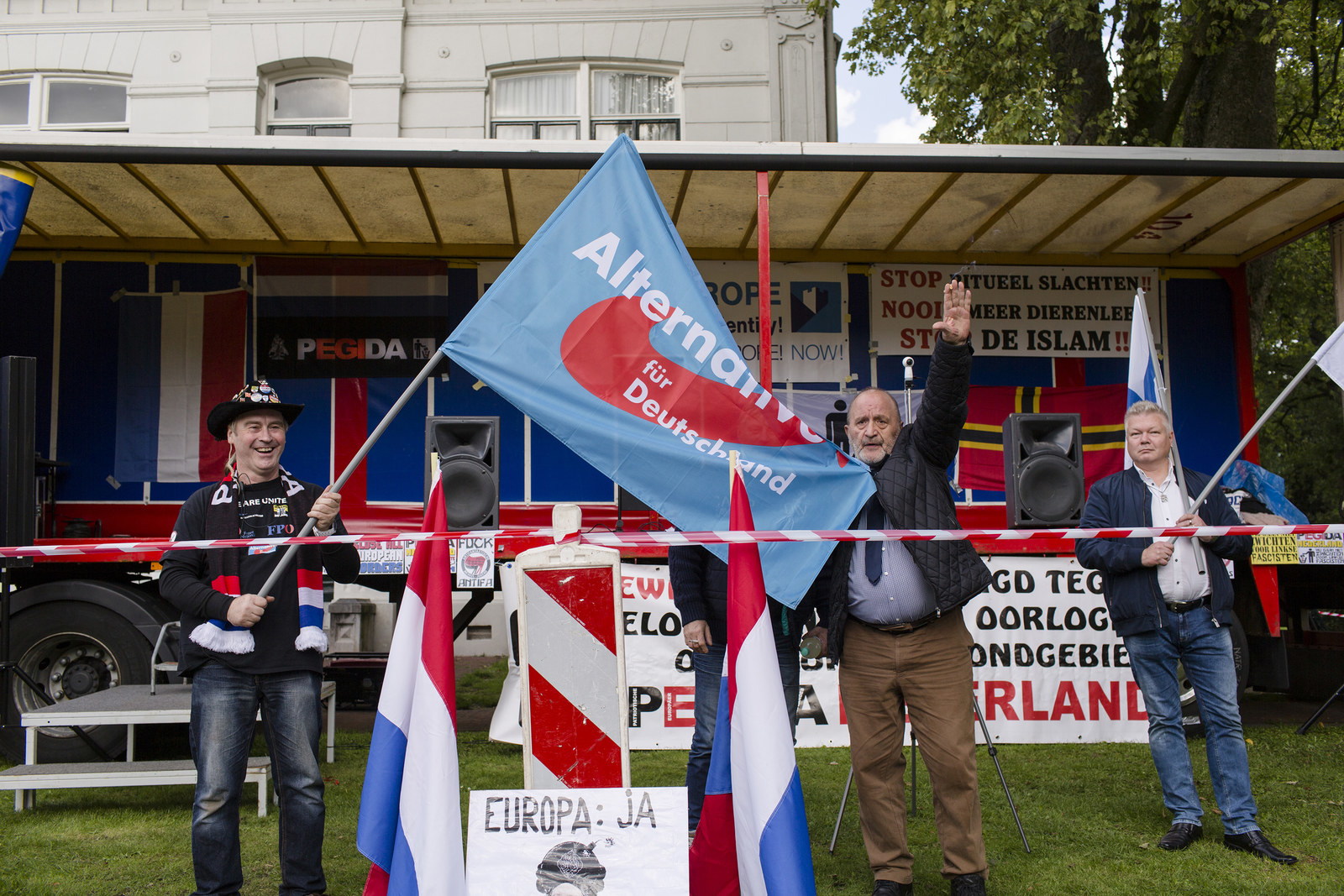
One week before Germany heads to the polls, a small city across the border in the Netherlands drew dozens of German nationalists for a rally and concert. A few carried posters of the Prophet Muhammad with a bomb for a turban, and several sported T-shirts or tattoos with neo-Nazi symbols. One man had a white-nationalist symbol tattooed on his shaved skull and wore a shirt in English reading “Niggers beware, the Klan is awake.”
The gathering was organized by a Dutch-born German resident named Edwin Wagensveld; he chose the Dutch city of Enschede hoping the momentum growing in Germany could carry to other parts of Europe. Finnish, Austrian, and British nationalists were also invited.
Wagensveld is an activist with the anti-Muslim movement Pegida. The rally also included the group Football Hooligans Against Salafism (HoGeSa), which organized a large anti-Muslim protest in Cologne in 2014; and Thügida, a Pegida spinoff in Thuringia and neighboring states.
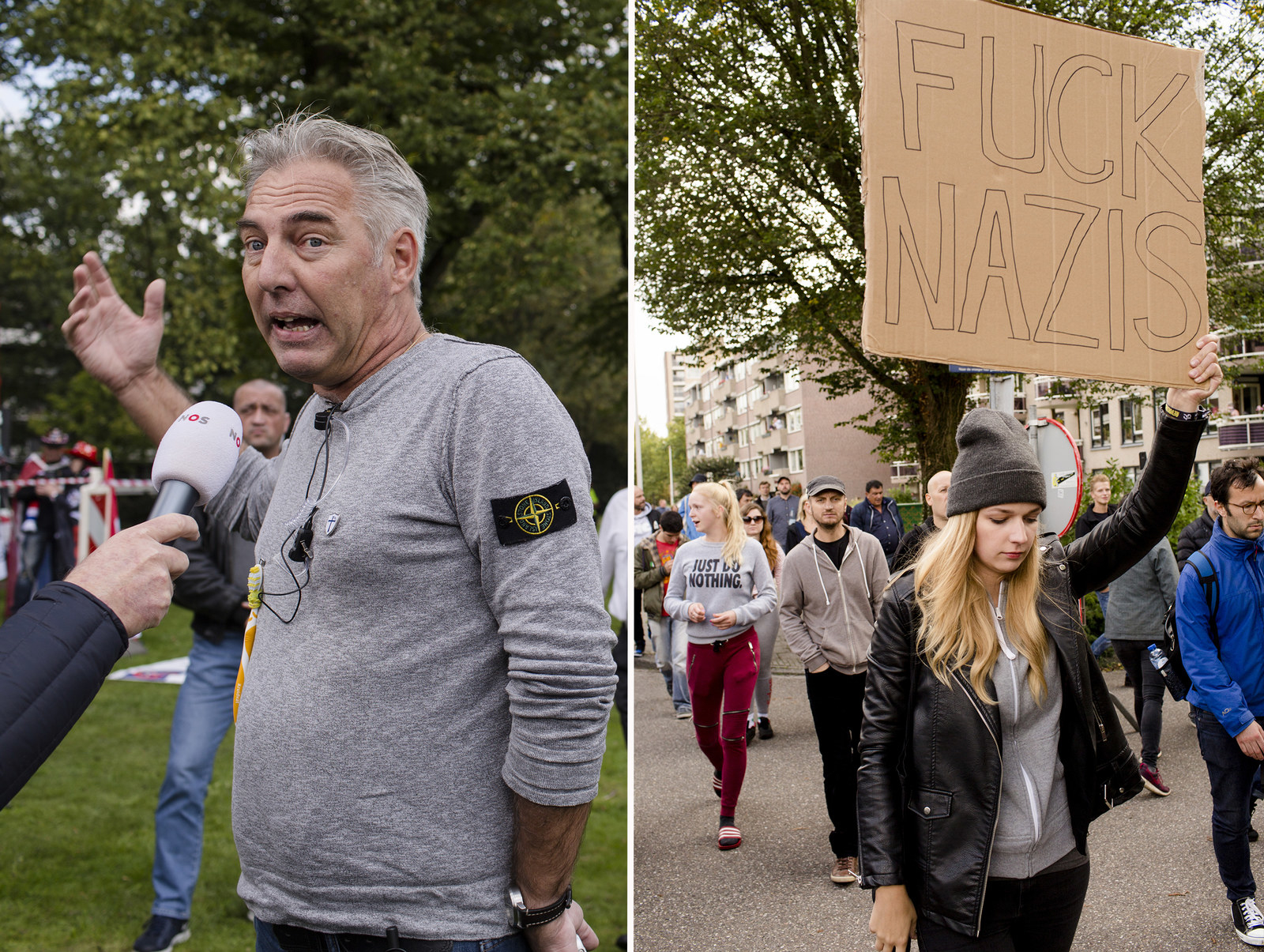
It was a rare gathering of groups that often were afraid of being associated with one another. It featured a performance by the neo-Nazi football hooligan band Kategorie C, which is scheduled to perform at Frenck’s bar just after the election. Their song “We Don’t Want Salafist Pigs” became the rally’s anthem. An AfD politician had even agreed to participate — the vice chair of the party in the state of Rhineland-Palatinate named Christiane Christen — but she told BuzzFeed News she had only “promised” to do so when she thought the rally would be at a different time. An AfD activist from Berlin spoke in her place.
The rally participants numbered about 150. They were heavily outnumbered by anti-fascist protesters and local immigrant teenagers as they briefly marched around the edge of town, surrounded by police using riot shields and horses. The counterprotesters drowned out the rally participants, so their chant of “We don’t want salafist pigs” was transformed into “We don’t want Nazi pigs.”
But these taunts didn’t trouble organizer Edwin Wagensveld.
“In these days, it is almost an honor if you are being called a Nazi,” he told BuzzFeed News. “It shows that you have your heart in the right spot for your fatherland.”


